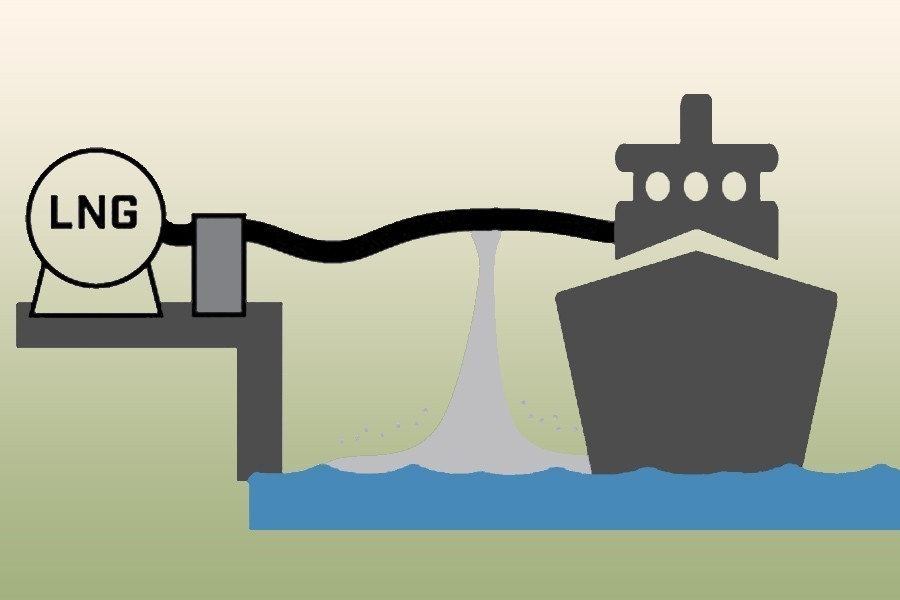Global suppliers are eyeing a burgeoning Bangladesh fuel market and scrambling for long-term supply deals, either by lobbying government high-ups or through competitive biddings, market-insiders say.
But energy experts and stakeholders opine that the government should float international tender inviting the interested long-term LNG (liquefied natural gas) suppliers to submit their price quotes and pick "the best offer".
Dwindling natural gas supplies from local gas fields and mounting demand from power plants and industries push the government to import LNG at its maximum capacity.
Augmented LNG imports from both spot market and term suppliers jacked up the country's LNG re-gasification to around 850 million cubic feet per day (mmcfd), the highest re-gasification capacity from the two operational FSRUs (floating, storage, re-gasification units).
"Seeing the mounting LNG demand, several suppliers have gone desperate to supply LNG at their 'selective' rates after inking deals with the government on unsolicited offers under the Speedy Supply of Power and Energy (Special Provision) Act 2010," it has been alleged.
The law has a provision of providing immunity to those involved with a quick-fix solution to fuel crunch.
State-run Petrobangla has so far picked three firms-US's Excelerate Energy, local Summit Group and Middle East's Emirates' National Oil Company (ENOC) - for negotiation, bypassing tender, on LNG purchase on a long-term basis.
But Petrobangla has not yet invited any other company to negotiate LNG purchases under long terms although more than half a dozen global LNG suppliers are keen to supply LNG to Bangladesh at competitive rates, said sources.
AOT Energy AG of Switzerland, Gunvor Group, Trafugura, Vitol Asia, and Eleris Energy are among the firms that are interested to supply the liquid gas under long terms.
A number of LNG suppliers are also interested in supplying the fuel from the Commonwealth of Independent States (CIS) countries.
Currently, Bangladesh imports around 3.5-million-tonne per year (MTPY) of LNG under long-term deals from only two state-run global suppliers-Qatar's Qatargas and Oman's Oman Trading International (OTI).
But the country needs to import around 30-million-tonnes per year of LNG to meet the growing local demand by 2041 as domestic gas reserves are depleting fast, according to a report prepared by Copenhagen-based research firm Ramboll in association with Geological Survey of Denmark and EQMS Consulting Limited.
"The country's existing gas reserves will run out by 2038 if no new exploration and discovery take place," says the report.
Bangladesh's current natural gas production from domestic fields is hovering around 2,300 mmcfd against the overall demand for around 4,000 mmcfd, according to Petrobangla.
This deficit has to be met by imports, the report says.
By 2041, the demand for natural gas would be around 8,000mmcfd, Petrobangla predicts.
Petrobangla inked first-ever sale and purchase agreement with Qatar's RasGas, later renamed Qatargas, on September 25, 2017, to buy annually around 2.5 million tonnes per year (Mtpa) of lean LNG over 15 years.
During the initial five years of the deal, QatarGas will supply annually around 1.8 Mtpa of LNG, which will be increased up to 2.5 Mtpa in next 10 years.
The state petroleum agency has a similar SPA with Oman's OTI to import annually around 1.0 Mtpa of LNG for 15 years.
"The government should select LNG suppliers following an open and competitive tendering instead," says energy adviser of the Consumers Association of Bangladesh (CAB) Prof M Shamsul Alam.
"If the government selects the suppliers from among shortlisted suppliers, the purchase price of expensive LNG will be costlier," he adds.
The government should select the suppliers either through competitive open tender or through 'Swiss Challenge' mechanism, energy expert Prof M Tamim says.
A Swiss challenge is a form of public procurement operated in some jurisdictions, which requires a public authority, which has received an unsolicited bid for a public project or for services to be provided to government, to publish the bid and invite third parties to match or better it.
"Otherwise the selection process will indicate the involvement of corruption," notes Mr Tamim, who was special assistant to the Chief Adviser of the former caretaker government.
azizjst@yahoo.com


